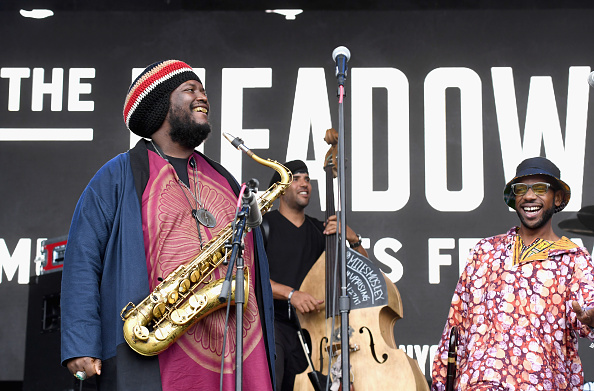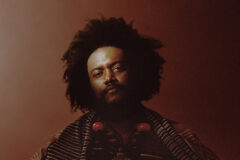If you’ve heard Kendrick Lamar’s To Pimp A Butterfly or Flying Lotus’ You’re Dead!, then you’ve heard Kamasi Washington. He’s one of the leading saxophone players and jazz musicians working right now, thanks to his spectacular and staggeringly ambitious debut album, 2015’s triple-disc The Epic. One of the more lauded efforts from last year, the album has put Washington in high demand not only with other respected artists, but also many of this year’s major music festivals—including Coachella, Bonnaroo, and, most recently, New York City’s the Meadows.
Performing with the Next Step, a band featuring lifelong friends like virtuosic bassist Thundercat, Washington has been tearing it up on tour. One of his amplifiers actually began to emit smoke during his set at this past weekend’s Meadows showcase. Before the show, I sat down with Washington to discuss his recent successes, his musical background, and the joy he gets from simply making songs with friends at his side. Read our conversation—which has been edited and condensed for clarity—below.
How does it feel to be the artist representing jazz at all of these big festivals? Or do you not think of it like that?
I never really thought about it like that. I try to think of it more like I’m representing myself. Jazz is a part of who I am. I feel like there’s jazz music in a lot of all these other artists as well, although there may be more jazz in my music. Jazz is such a wide thing. There’s so many voices and artists and so much to it. I just look at it like, “I’m just trying to play my music.”
https://youtube.com/watch?v=NtQRBzSN9Vw%3Flist%3DPLT_aBs9pjfFY_EKyN9ETe8mCVAe5hpkb1
I know that music was a big part of your life growing up. Is there a specific moment you remember when you decided to start playing music, or did it just kind of happen naturally?
I don’t really remember starting music because I started drums when I was around three years old, but I do remember when I started playing the saxophone. I went from drums to piano when I was five, and then clarinet when I was nine, but when I was 11, I really started getting into jazz. I wanted to switch to saxophone but my dad wouldn’t let me. So, one day he left the saxophone out at rehearsal and I just took it, just to see, because he always told me it was just like the clarinet. I was playing all these jazz songs on clarinet, like Wayne Shorter, and it just didn’t sound right. I took his soprano saxophone, and it was the first time that I played music and it sounded like the music that was always in my head. I said, “That’s a wrap,” and I told my dad that day, “That’s it.”
I saw your show back in February at Webster Hall and there was a part where you brought your father out to play a song together that you wrote about your grandmother called “Henrietta Our Hero.” What’s it like for that kind of family moment to come full circle?
It’s amazing. My grandmother was a very hard-working, humble woman. She would do anything for you. Even though she struggled a lot with mental health and finances, it didn’t matter. If you needed something, somehow she would make it happen. I’ve had a couple moments where I’ve played that song and I had to wipe away my emotions. It’s just beautiful where music can take us.
How did you form the Next Step, this massive group where you have shows with two drummers playing simultaneously, and, at one time, two upright bass players?
It was fate. We all grew up together. In the end, I was always the kind of guy who just wanted everyone to play in my band. I liked chaos like that, I guess. I didn’t set out for that instrumentation necessarily, it was more that I just had all these musicians that were my friends, and I loved the way they all played. So I just wanted all of them in there. That’s how it ended up happening randomly. I had this gig once where the whole rhythm section canceled, so I called up my other set of friends and everybody showed up. I said, “Let’s see what this sounds like,” and it sounded cool. That’s been my band from then on.
Can you talk a bit about what it’s like working with hip-hop artists like Snoop Dogg and Kendrick Lamar?
When I started playing with Snoop, I mean, I had listened to hip-hop, but I never really studied it. I didn’t know what to expect. When I started playing with them, I realized that every style of music has its own language and its own objective. The objective of jazz isn’t the same as the objective of hip-hop. When you play their music, you have to surrender yourself to what they’re trying to do. Even though there’s jazz intertwined in the music, the objective of what they’re trying to do is different.
I know that you listen to all different styles of music from outside the United States—can you suggest one artist or record from outside of the country that everyone should check out?
“Legacy” by Ali Akbar Khan. It’s a record that really inspired me. It’s North Indian classical, really beautiful. He took a Bollywood star as his apprentice and she has a really amazing voice.
What’s the plan for your next release?
Well, Terrace [Martin, multi-instrumentalist and one of the producers of Kendrick Lamar’s To Pimp A Butterfly], and Thundercat have always been a part of it. We’re definitely playing different music. Stylistically the music has evolved, and is always changing, but I’m always just so excited to make music with my friends. When we recorded The Epic, I called everybody in and waited for the planets to align so that we could all be together. There’s room for new things, so I’m still working on that level, but it definitely still has the core of the family in there.





